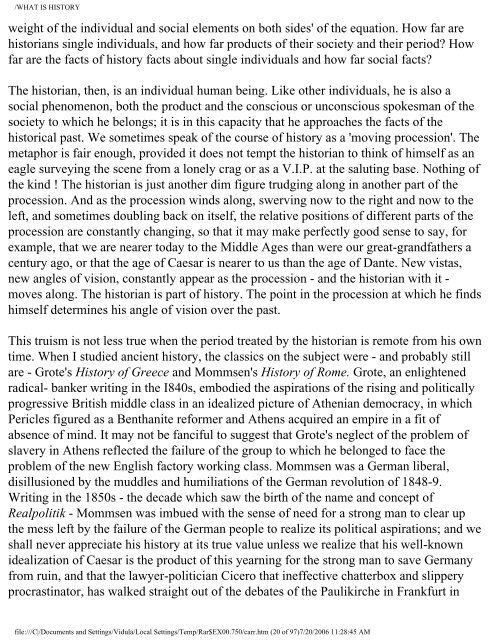What is History / by Edward Hallett Carr - Universal History Library
What is History / by Edward Hallett Carr - Universal History Library
What is History / by Edward Hallett Carr - Universal History Library
You also want an ePaper? Increase the reach of your titles
YUMPU automatically turns print PDFs into web optimized ePapers that Google loves.
WHAT IS HISTORY<br />
weight of the individual and social elements on both sides' of the equation. How far are<br />
h<strong>is</strong>torians single individuals, and how far products of their society and their period? How<br />
far are the facts of h<strong>is</strong>tory facts about single individuals and how far social facts?<br />
The h<strong>is</strong>torian, then, <strong>is</strong> an individual human being. Like other individuals, he <strong>is</strong> also a<br />
social phenomenon, both the product and the conscious or unconscious spokesman of the<br />
society to which he belongs; it <strong>is</strong> in th<strong>is</strong> capacity that he approaches the facts of the<br />
h<strong>is</strong>torical past. We sometimes speak of the course of h<strong>is</strong>tory as a 'moving procession'. The<br />
metaphor <strong>is</strong> fair enough, provided it does not tempt the h<strong>is</strong>torian to think of himself as an<br />
eagle surveying the scene from a lonely crag or as a V.I.P. at the saluting base. Nothing of<br />
the kind ! The h<strong>is</strong>torian <strong>is</strong> just another dim figure trudging along in another part of the<br />
procession. And as the procession winds along, swerving now to the right and now to the<br />
left, and sometimes doubling back on itself, the relative positions of different parts of the<br />
procession are constantly changing, so that it may make perfectly good sense to say, for<br />
example, that we are nearer today to the Middle Ages than were our great-grandfathers a<br />
century ago, or that the age of Caesar <strong>is</strong> nearer to us than the age of Dante. New v<strong>is</strong>tas,<br />
new angles of v<strong>is</strong>ion, constantly appear as the procession - and the h<strong>is</strong>torian with it -<br />
moves along. The h<strong>is</strong>torian <strong>is</strong> part of h<strong>is</strong>tory. The point in the procession at which he finds<br />
himself determines h<strong>is</strong> angle of v<strong>is</strong>ion over the past.<br />
Th<strong>is</strong> tru<strong>is</strong>m <strong>is</strong> not less true when the period treated <strong>by</strong> the h<strong>is</strong>torian <strong>is</strong> remote from h<strong>is</strong> own<br />
time. When I studied ancient h<strong>is</strong>tory, the classics on the subject were - and probably still<br />
are - Grote's H<strong>is</strong>tory of Greece and Mommsen's H<strong>is</strong>tory of Rome. Grote, an enlightened<br />
radical- banker writing in the I840s, embodied the aspirations of the r<strong>is</strong>ing and politically<br />
progressive Brit<strong>is</strong>h middle class in an idealized picture of Athenian democracy, in which<br />
Pericles figured as a Benthanite reformer and Athens acquired an empire in a fit of<br />
absence of mind. It may not be fanciful to suggest that Grote's neglect of the problem of<br />
slavery in Athens reflected the failure of the group to which he belonged to face the<br />
problem of the new Engl<strong>is</strong>h factory working class. Mommsen was a German liberal,<br />
d<strong>is</strong>illusioned <strong>by</strong> the muddles and humiliations of the German revolution of 1848-9.<br />
Writing in the 1850s - the decade which saw the birth of the name and concept of<br />
Realpolitik - Mommsen was imbued with the sense of need for a strong man to clear up<br />
the mess left <strong>by</strong> the failure of the German people to realize its political aspirations; and we<br />
shall never appreciate h<strong>is</strong> h<strong>is</strong>tory at its true value unless we realize that h<strong>is</strong> well-known<br />
idealization of Caesar <strong>is</strong> the product of th<strong>is</strong> yearning for the strong man to save Germany<br />
from ruin, and that the lawyer-politician Cicero that ineffective chatterbox and slippery<br />
procrastinator, has walked straight out of the debates of the Paulikirche in Frankfurt in<br />
file:///C|/Documents and Settings/Vidula/Local Settings/Temp/Rar$EX00.750/carr.htm (20 of 97)7/20/2006 11:28:45 AM







